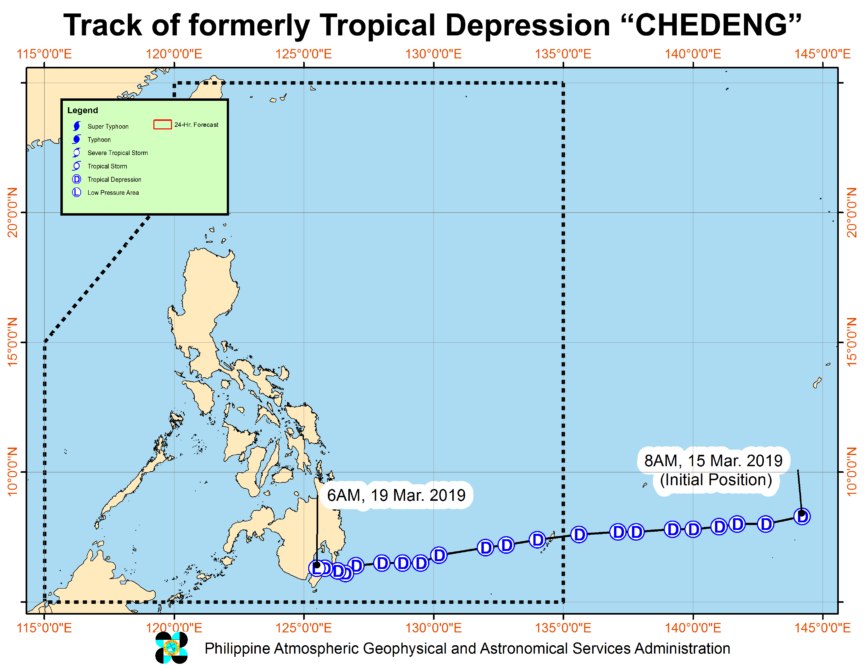 Image courtesy of PAGASA
Image courtesy of PAGASA
GENERAL SANTOS CITY (MindaNews/19 March) – Classes were suspended on Tuesday up to the senior high school level in South Cotabato, parts of Sarangani and in this city due to tropical depression Chedeng, which has already weakened into a low pressure area.
Jerome Barranco, assistant regional director of the Office of Civil Defense (OCD) in Region 12, said the class suspensions were declared by city and municipal governments in the affected areas.
“This is a precautionary measure against possible flooding and landslides,” he said in a radio interview.
Tropical cyclone signal number 1 was raised on Monday in parts of the region, especially in this city and the eastern portions of Sarangani, South Cotabato and North Cotabato, but it was lifted on Tuesday morning after Chedeng weakened as it made landfall over Malita, Davao Occidental around 5:30 a.m.
But the Philippine Atmospheric Geophysical and Astronomical Services Administration (Pagasa) said “scattered to at times widespread moderate to heavy rains” will still be experienced in parts of Mindanao, including Region 12.
OCD-12 initially placed the region under “blue alert” status on Monday morning due to Chedeng.
City Mayor Ronnel Rivera issued Proclamation No. 1 late Monday afternoon, declaring class suspensions on Tuesday in pre-school and elementary levels in all private and public schools in the city.
He said the move was aimed to “avert any untoward incident from happening, as well as to prevent any inconvenience that the heavy rains may bring upon the young people of the city.”
In Sarangani province, the Provincial Disaster Risk Reduction and Management Office (PDRRMO) said in an advisory that class suspensions were declared in the pre-school and elementary levels in the eastern municipalities of Malungon, Glan, Malapatan and Alabel.
It said no similar declarations were made yet in the western towns of Maasim, Kiamba and Maitum, noting that it would depend on the intensity of the rains in the area.
Milagros Lorca, head of PDRRMO-South Cotabato, said classes were already suspended as of 7 a.m. from pre-school to senior high schools within the province’s 10 towns and lone city.
She said there were some municipalities that declared class suspensions in all levels or including tertiary or college.
In Koronadal City, the city government initially declared the suspension of classes from pre-school to elementary levels but later upgraded it to the senior high school level in all private and public schools “to prevent them to be exposed to danger brought about by continuous downpour” brought by Chedeng.
“We’re continuously monitored the situation on the ground, especially if the rains will later intensify,” Lorca said.
The official said the province has been so far experiencing continuous moderate rains since early Tuesday.
As of 8 a.m., Pagasa raised the rainfall warning to orange in the area or “flooding is threatening in low lying areas and along river channels, and landslides in mountainous areas.”
Lorca said they are closely monitoring some remote areas, especially villages in T’boli and Lake Sebu towns, due to the possible occurrence of landslides.
“As of now, we have not recorded any untoward incident due to Chedeng,” she said.
She added that all operations centers of the city and municipal DRRM councils have been activated and advised to regularly report the situation in their areas of responsibility. (MindaNews)
